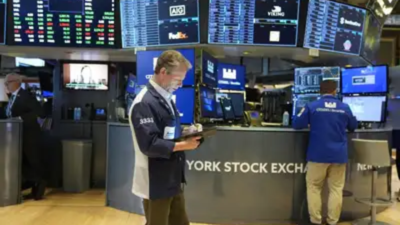US stocks rallied Thursday as a wave of better-than-expected corporate earnings lifted investor sentiment, though concerns about ongoing trade tensions and economic uncertainty continue to loom over Wall Street.
According to the Associated Press, the S&P 500 climbed 1.9% in late trading, narrowing the gap to within 11% of its all-time high set earlier this year. The Dow Jones Industrial Average added 450 points, or 1.1%, while the tech-heavy Nasdaq composite surged 2.5%, as strong performance from major tech and industrial companies buoyed markets.
A standout contributor to the rally was ServiceNow, which saw its stock jump 15.8% after reporting first-quarter profits for 2025 that exceeded analyst expectations. The AI-powered enterprise software company also issued an upbeat forecast for subscription revenue, further boosting investor confidence.
Southwest Airlines also delivered stronger-than-anticipated earnings, despite uncertainty clouding the broader economic outlook. CEO Bob Jordan emphasized the company is “controlling what we can control,” announcing plans to reduce flight schedules in the second half of the year. Southwest’s stock fluctuated through the day before ending up 3.2%.
Rival American Airlines joined in pulling its full-year guidance due to economic unpredictability but saw its stock rise 3.3% after beating quarterly profit estimates. Many companies, spanning various industries, echoed similar concerns about issuing financial forecasts amid the volatile climate created by Trump’s trade policies.
The trade war, sparked by the on-again-off-again imposition of tariffs by President Donald Trump, has left businesses and investors grappling with shifting headlines and economic consequences. Optimism over a softening stance on tariffs had lifted markets earlier in the week, but that was shaken Thursday when China denied being in active negotiations with the US, likening reports of progress to “trying to catch the wind.”
Tan Jing Yi of Mizuho Bank’s Asia & Oceania Treasury Department described Trump’s trade strategy as “headline turbulence,” warning of long-term harm to global economies and adding that sentiment continues to swing wildly “from hopes of intense relief to inflicted economic gloom.”
The market’s week has been marked by extreme swings—beginning with sharp losses on trade fears and now rebounding on strong earnings—reflecting the lack of clarity around future economic policies. “It’s an unhealthy market backdrop right now, and we’re trying not to react too much,” said John Belton, a portfolio manager at Gabelli Funds.
Despite the broader uncertainty, several companies delivered standout earnings results. Toymaker Hasbro saw its shares soar 15.6% after reporting stronger-than-expected profit and revenue, citing continued growth of its Magic: The Gathering card game. Semiconductor giant Texas Instruments also impressed, rallying 6.2% on better-than-forecast earnings.
However, not all earnings news was positive. Consumer goods titan Procter & Gamble fell 3.6% even after beating profit expectations. The company’s revenue came in below forecasts, and it trimmed its full-year profit outlook, citing a $200 million earnings hit from higher commodity costs.
PepsiCo similarly warned of challenges ahead. CEO Ramon Laguarta highlighted “more volatility and uncertainty,” with subdued consumer demand and higher costs due to tariffs—including a 25% import tariff on aluminum cans—contributing to a 5% drop in the company’s shares after it lowered its profit forecast for 2025.
In the bond market, Treasury yields eased, with the 10-year yield falling to 4.30% from 4.40% the previous day. The decline followed a report showing that slightly more Americans filed for unemployment benefits last week than anticipated. Additionally, March saw a sharper-than-expected drop in sales of previously owned homes, further signaling potential economic softening.
Overseas, stock markets in Europe and Asia saw modest and mixed movements, reflecting the global ripple effects of trade policy uncertainties and economic concerns.
While the earnings season has provided a temporary lift, market watchers agree that volatility is likely to persist until clearer signals emerge about the direction of US trade and fiscal policy. For now, Wall Street appears to be navigating a delicate balance between strong current performance and an unpredictable future.










